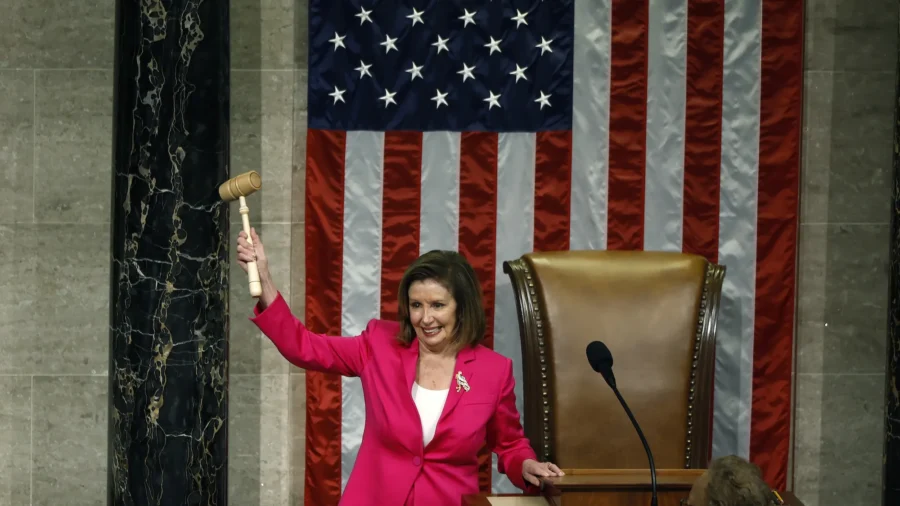In a landmark decision, a federal judge in Texas has ruled that a $1.7 trillion government funding bill was unconstitutionally passed in 2022 because lawmakers voted by proxy rather than in person due to a pandemic-era rule.
U.S. District Judge James Wesley Hendrix, an appointee of former President Donald Trump, issued a memorandum opinion and order on Feb. 27, finding that lawmakers violated the Constitution’s Quorum Clause when, in December 2022, they passed the Consolidated Appropriations Act of 2023, the largest ever spending package in U.S. history.
The Biden administration, which was sued over the matter by Texas Attorney General Ken Paxton, argued that the court didn’t have the power to address the issue “because it cannot look to extrinsic evidence to question whether a bill became law,” per the order.
Judge Hendrix disagreed because, as he said in the order, the court was interpreting and enforcing the U.S. Constitution rather than second-guessing the vote count.
“The Court concludes that, by including members who were indisputably absent in the quorum count, the Act at issue passed in violation of the Constitution’s Quorum Clause,” the judge wrote.
The judge gave the Department of Justice (DOJ), which was representing the Biden administration in the case, a week to file an appeal.
A DOJ spokesperson told The Epoch Times in an emailed statement that the agency would not comment on an ongoing matter.
Mr. Paxton, who led the lawsuit against the Biden administration, said in a statement that he was “relieved” that the court upheld the Constitution.
More Details
Then-House Speaker Nancy Pelosi (D-Calif.) was instrumental in implementing the proxy voting rule in May 2020, citing the outbreak of COVID-19 as justification.
The proxy voting rule, which was extended several times, let members of the 435-seat House serve as proxies for colleagues who were unable to cast floor votes in the chamber, either because they were in quarantine or for other reasons.
In December 2022, when the $1.7 trillion bill was passed, more than half of the members of what was then a Democrat-led House weren’t present to provide quorum and voted by proxy.
Republican lawmakers have called the proxy vote rule a violation of the Constitution, arguing that only the votes of lawmakers who are physically present in Congressional chambers should count as legitimate.
An initial legal challenge to the proxy voting rule failed when the U.S. Supreme Court in January 2023 declined to hear a challenge brought by then House Republican leader Kevin McCarthy (R-Calif.) and other GOP members, who asked the high court to reverse a lower court decision that allowed the proxy voting rules to remain in effect.
Later, in February 2023, Texas Attorney General Ken Paxton sued President Joe Biden and members of his administration for allegedly unlawfully signing and implementing the $1.7 trillion spending bill.

Judge Hendrix’s Feb. 27 ruling came in the Paxton lawsuit. But while the judge found that the proxy voting rule was unconstitutional, he called the scope of his ruling “limited” and said it did not nullify the entire $1.7 trillion spending bill.
“The relief granted here is limited to abating the injury that Texas has proven will occur,” Judge Hendrix wrote in the opinion while blocking one provision (the Pregnant Workers Fairness Act) from being enforced against Texas.
‘Congress Acted Egregiously’
In his lawsuit, Mr. Paxton alleged that the Pregnant Workers Fairness Act put undue burden on the state government to accommodate pregnant employees, arguing that Texas already has laws that accommodate pregnancies and that unconstitutionally passed provision risked opening the state to lawsuits.
“As a matter of course, Texas accommodates the reasonable needs of its pregnant employees,” Mr. Paxton wrote in a motion requesting a preliminary injunction, before describing how the legal status quo already provides reasonable accommodations.
However, Mr. Paxton argued that the Consolidated Appropriations Act of 2023 “directly affects Texas by altering this long-standing status quo” and amends existing laws “to open Texas to lawsuits to which it has never before been subjected.”
Further, he argued that the provision’s attempt to regulate Texas and its state agencies also was a bid “to waive Texas’ sovereign immunity.”
In a Feb. 28 final judgment, the judge said that Texas’ other claims against the Biden administration over other provisions in the spending bill, including a $20 million pilot program that Mr. Paxton said encourages illegal aliens to seek additional spending from states, were dismissed without prejudice for lack of standing.
“All other relief is denied,” Judge Hendrix wrote in the final judgment.
Mr. Paxton issued a statement reacting to the ruling.
“Congress acted egregiously by passing the largest spending bill in U.S. history with fewer than half the members of the House bothering to do their jobs, show up, and vote in person,” Mr. Paxton said in the statement.
“Former Speaker Nancy Pelosi abused proxy voting under the pretext of COVID-19 to pass this law, then Biden signed it, knowing they violated the Constitution. This was a stunning violation of the rule of law. I am relieved the Court upheld the Constitution,” he added.
From The Epoch Times


